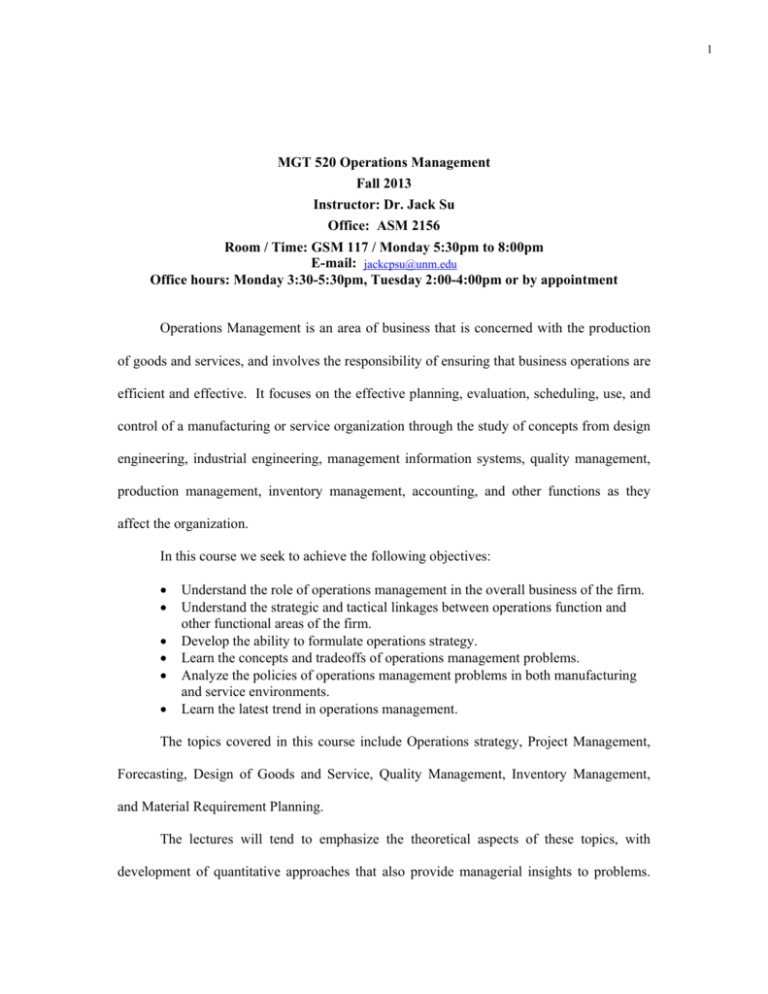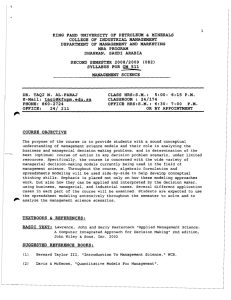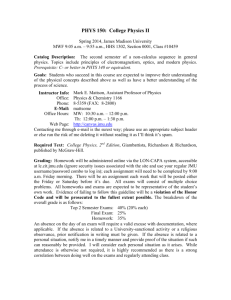MGT 520 Operations Management Fall 2013 Instructor: Dr. Jack Su
advertisement

1 MGT 520 Operations Management Fall 2013 Instructor: Dr. Jack Su Office: ASM 2156 Room / Time: GSM 117 / Monday 5:30pm to 8:00pm E-mail: jackcpsu@unm.edu Office hours: Monday 3:30-5:30pm, Tuesday 2:00-4:00pm or by appointment Operations Management is an area of business that is concerned with the production of goods and services, and involves the responsibility of ensuring that business operations are efficient and effective. It focuses on the effective planning, evaluation, scheduling, use, and control of a manufacturing or service organization through the study of concepts from design engineering, industrial engineering, management information systems, quality management, production management, inventory management, accounting, and other functions as they affect the organization. In this course we seek to achieve the following objectives: Understand the role of operations management in the overall business of the firm. Understand the strategic and tactical linkages between operations function and other functional areas of the firm. Develop the ability to formulate operations strategy. Learn the concepts and tradeoffs of operations management problems. Analyze the policies of operations management problems in both manufacturing and service environments. Learn the latest trend in operations management. The topics covered in this course include Operations strategy, Project Management, Forecasting, Design of Goods and Service, Quality Management, Inventory Management, and Material Requirement Planning. The lectures will tend to emphasize the theoretical aspects of these topics, with development of quantitative approaches that also provide managerial insights to problems. 2 Homework and cases will tend to focus on the practical applications of the concepts and techniques developed in class to a variety of industrial contexts. Additional instruction may be provided through guest lectures, cases, videos, or projects to help match theory and practice. This is not a course in mathematics, although mathematics is used in the course as the language for formally defining problems and as means of finding solutions. The requirements for particular mathematics should be within your capabilities. MATERIALS Operations Management (10th Edition) by Jay Heizer and Barry Render, Prentice Hall, ISBN-10:0-13-611941-7. GRADING The grade received in the course will be based on two in class exams, a semester project presentation, attendance, and class participation. The Learning Assessment Test is conducted online. The weights are as following: First in Class Exam (30%) Second in Class Exam (30%) Semester Project Presentation (35%) Class Attendance (5%) Learning Assessment Test (2%) The total is 102%. 3 Percentage of grade Letter grade 97 and above A+ 93-96 A 90-92 A- 87-89 B+ 83-86 B 80-82 B- 76-79 C+ 70-75 C 69 and bellow F Please notice that there will be no make-up exam. Students who must miss an exam to attend an official UNM function must prearrange an alternate arrangement. If you are too ill to attend an exam or you have some other emergencies, you must inform the instructor no later than the exam date. You should present appropriate documentation for other arrangement. All others will receive a grade of zero. SEMESTER PROJECT GRADING POLICY The objective of the semester project is for students to show the following abilities: 1. Identify interesting operations management issues. 2. Officially formulate these issues into solvable or analyzable problems. 3. Rigorously solve or analyze the problems using the tools or concepts discussed in the class. 4 4. Derive managerial insights from the solutions found or perform scenario analysis. 5. Effectively communicate the problem, the solution and analysis processes, the solutions, and the managerial insights with the audience. Interesting issues usually consist of two characteristics. First, it is relevant. Namely, the potential benefit of resolving the issue is significant to the individual, to the organization, or to the society. Second, the solution is not trivial. A rigorous solution or analysis process is required to find the solution. Managerial insights are the general management guidelines that you summarized from you analysis that will help the mangers understand the trade-offs of the problem and improve their decision making ability. To fulfill the above objective, I suggest you include the following content in your semester project presentation: 1. Background introduction to the organization and to the problem you are analyzing to help the audience understand your motivation. 2. Problem statement. 3. Methodology, tools, and processes used to solve or analyze the problem. 4. Solutions. 5. Managerial insights and/or scenario analysis. 6. Discussion of potential benefit and future extension. I also strongly suggest you work with someone within the organization to identify the issue from scratch. Not just analysis the problems you found on articles written by someone else. Your grade will depends on how well you fulfill the objective of the semester project. 5 HOMEWORK To help students understand the material and prepare the exams, homework problems will be assigned. Students are strongly encouraged to do these homework problems. Solutions to these problems will not be collected and graded. Homework solutions will be provided. While there is no grade assigned to homework problems, some of the problems on the exams are very likely to be related to the homework assignment. Hence, it is important that you spend time thinking about the homework problems. TENTATIVE CLASS SCHEDULE August 19: Introduction to Operations Management Define Operations and Operations Management Operations Management and Other Functional Areas Read Chapter 1 August 26 and September 9: Operations Strategy History of Operations Management Strategic Issues of Operations Management Theories of Operations Management Formulation of Operations Strategy Productivity Break Even Analysis Read Chapter 2 Homework: Chapter 1 and 7 Practice Problems September 2: Labor Day No Class September 16: Project Management PERT/ CPM 6 Read Chapter 3 Homework: Chapter 3 Practice Problems September 23: Forecasting Native Approach Moving Average Exponential Smoothing Measuring Forecasting Error Read Chapter 4 Homework: Chapter 4 Practice Problems September 30: First In-Class Exam Include Chapter 1-4 October 7: Semester Project Day Instructor will attend INFORMS annual conference October 14 and 21: Design of Goods and Service House of Quality Bill of Material Decision Tree Read Chapter 5 Homework: Chapter 5 Practice Problems October 28: Quality Management Define Quality ISO9000, ISO14000 Total Quality Management Magnificent Seven Read Chapter 6 7 Homework: Chapter 6 Practice Problems November 4 and 11: Inventory Management EOQ Model WW Procedure Stochastic Demand Inventory Policy Read Chapter 12 Homework: Chapter 12 Practice Problems November 18: Material Requirement Planning Teaching Evaluation MRP Lot Sizing Read Chapter 14 Homework: Chapter 14 Practice Problems November 25: Semester Project Presentation December 2: Second in-Class Exam Include Chapter 5, 6, 12, 14






